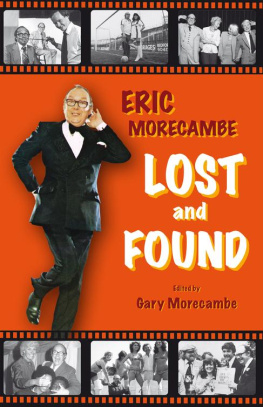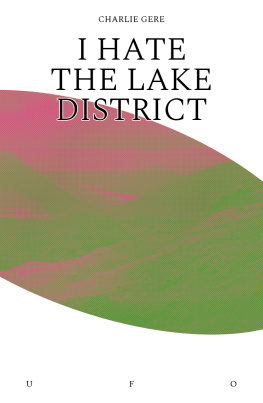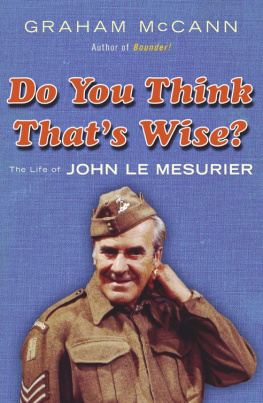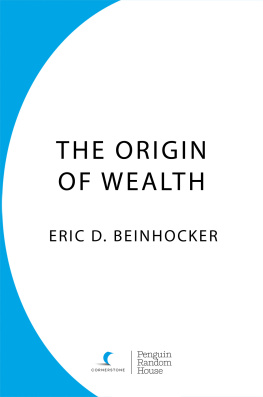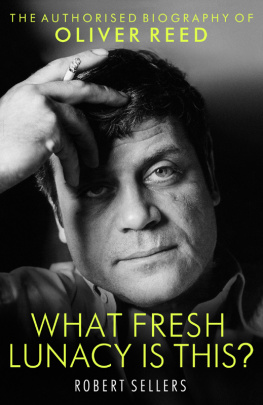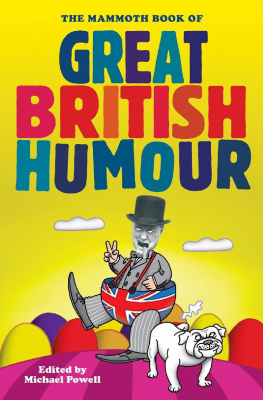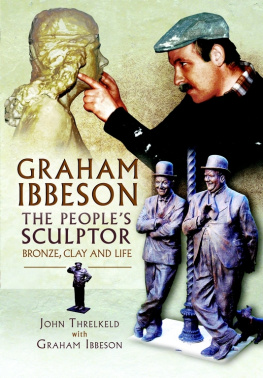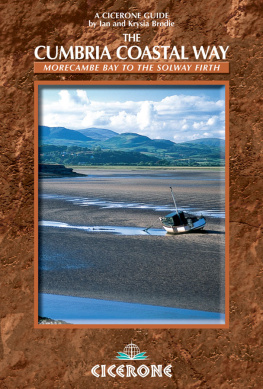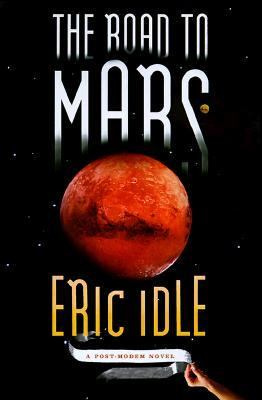Gary Morecambe is the son of comedian Eric Morecambe . He was born in London in 1956. After several years as a publicist for a leading theatrical agency, he became a full-time writer in 1982 and has published over twenty titles ranging from biography to fiction. In 2002, he was consultant to Kenneth Branaghs West End and Broadway hit The Play What I Wrote.
He has recently begun to direct short films based on his own published stories, and much of the rest of his time is spent working on Morecambe & Wise-related projects, from which he continues to derive the greatest pleasure. He has four grown-up children and lives with his partner, Margo, in Bath.
A life-long fan of Eric Morecambe and Morecambe & Wise, Paul Burton was proud to be engaged to work as archivist, researcher and interviewer on Eric Morecambe: Lost and Found.
He has a prolific number of writing, producing and directing credits to his name. Since 1989, Paul has founded and run several of his own arts projects , including theatre, film and television projects. He now works as a freelance writer, consultant, filmmaker and film and TV historian.
His credits also include being engaged by the management of Elstree Studios to work on projects relating to the history of the complex; and co-writing a biography of the Carry On film actor Kenneth Connor.
M y researcher, Paul Burton, and I would like to take this opportunity to sincerely thank the many individuals, companies, managements and agencies, etc. who have given us their time and help during the process of compiling this publication. It would be impossible to name them all. However, we would like to take a moment to credit just some of those who have made this book possible.
Firstly, wed like to thank the estate of Eric Morecambe for their invaluable support.
Special thanks to my sister, Gail Morecambe, and comedienne and actress Miranda Hart for writing the foreword.
Were especially indebted to James Gillson and all at the Lords Taverners, for their huge generosity in allowing us to use a number of photos from their archives, which relate to Erics work for the charity.
Huge appreciation goes to Gareth Owen ( Go-Photo ) and Roger Wash (Club Historian, Luton Town FC), for granting us permission to use several photos relating to Erics time as a director at the football club.
An extra-special thank you is due to Stan and Roger Stennett for providing us with material from their photographic archive.
Sincere thanks to producer/director Charles Wallace of Moving Image Company for allowing us to use stills from his film The Passionate Pilgrim.
Wed like to thank those individuals who have contributed their memories and, in certain cases, photos to this book. In alphabetical order: David Benson, Lionel Blair, Ted Childs, Jan Clennell, Brian Conley, Gemma Craven, Jim Davidson, Richard Digance , Ken Dodd, Nicki Edwards, Sir Bruce Forsyth, Tania Glyde, Hannah Gordon, Michael Grade, Carl Gresham, Tony Hatch, Eddie Izzard, Tammy Jones, Robin King, Dennis Kirkland, Burt Kwouk, Vicki Michelle, Ben Miller, Mavis Nicholson, Simon Pegg, Pamela Salem, Madeline Smith, Richard Stone, Jimmy Tarbuck, Carole Todd, Valerie Van Ost, Roger Wash, Linda Willis, Victoria Wood, Mike Yarwood and Paul Zenon.
Our warmest thanks also go to the following. In alphabetical order: Jane Foster of the stills department at FremantleMedia, for giving us so much of her time, enthusiasm and patience; Ian Freeman; Jo Kirkland and the Dennis Kirkland Estate; Madame Tussauds, Blackpool; Seb Thompson at Brazen PR and TV-am/AP Archive.
And to anyone we might have overlooked, we give our eternal thanks.
Gary Morecambe
F irst and foremost, this book is a celebration of a British icon who also happened to be my dad!
I joined the Morecambe & Wise bandwagon in April 1956, but was not conscious of it until after my fifth birthday when I saw my father on TV for the first time, which is when he and Ernie started broadcasting their half-hour Morecambe & Wise shows for ATV. This coincided with my arrival at primary school, and, at this first rung on the educational ladder , I came into regular contact with the earliest TV critics none of them older than eight! What they gave me was an understanding of how Morecambe & Wise were perceived outside the four walls of our house. It is not surprising therefore that this was the moment I chose to put my father on a pedestal.
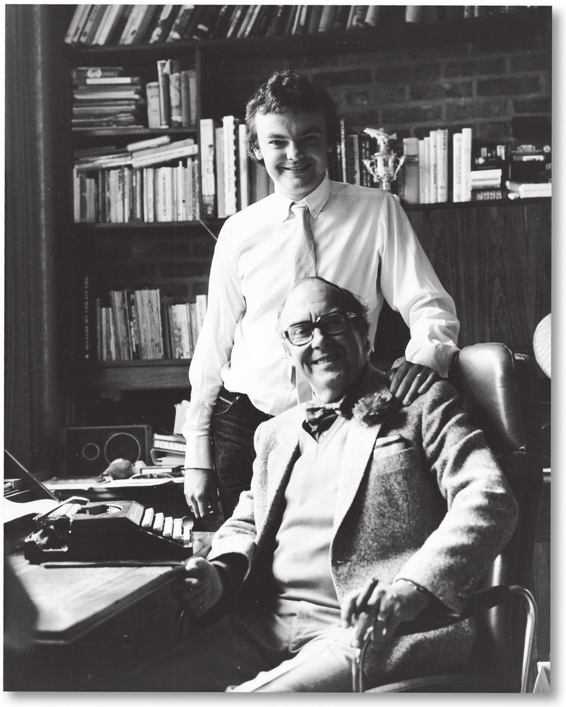
The author with his dad! A publicity shot we had taken in 1982, prior to a joint appearance on Russell Hartys chat show. GM
Just because he was on a pedestal, and has remained there for me even now as I write these words at the tender age of fifty-six, doesnt mean every day is a rose-tinted memory. As a father and son, we could argue quite easily but Dad and comedian Eric Morecambe were two different things to me, and they were to him, too, as he mostly referred to their double act in the third person.
I suppose that, until I was a teenager, squabbling or doing anything that was considered unbecoming was completely off the agenda. But what a ten-year-old might go along with, a seventeen-year-old does not.
Its strange to recall that even my teenage angst (what little there was of it) was diffused by his humour. Its really difficult to be the defiant child when the parent doesnt outwardly disagree with any opinions you have, but with comedic precision exposes the limitations of your thought processes. And it was so difficult to outrage a man who never understood the meaning of embarrassment.
The only way to upset my father was to mention Ernie Wise in a negative way. He could say what he wanted at any given moment about his partner , but that wasnt a licence for you to join in. Its something Ive given much thought to in recent times, and my conclusion would be that each was very protective of the other theyd been together since the age of twelve or thirteen. Closer than brothers, their scriptwriter Eddie Braben has described them. I wouldnt argue with that. I know, for instance, that they would finish each others sentences in a manner suggestive of a childhood spent together.
I wrote in an earlier book about my father that it would certainly be my last written work about Eric Morecambe. And so it would have been had not circumstances contrived to occasion what you are now reading.
It began on a visit to my mothers house at the beginning of 2011. On arriving at the old family home, filled with childhood memories coloured by my fathers massive personality, I found her in the kitchen waving a copy of The Times newspaper in her hand. She showed me a photo of my father taken at a Luton Town FC event. It was a photo neither of us had set eyes upon. Imagine how many photos of Dad must be out there that we havent seen, she remarked, unaware what impact those words were to have on me.
Yes, I nodded. Wouldnt it be great to collect some of them and put them into a book so we have a permanent record?
It was just a throwaway comment, but one that would lead to precisely that end. At that particular time though, the thought of trawling through my own and others personal photographic collections, as well as those of the media, to collate photos of my father was not a realistic one. I was busy with other things, particularly directing a run of short films for transmission on selected satellite TV channels, and my intention never to do any more Morecambe & Wise-related books had not been formed lightly. Id been writing books related to my father on and off for some thirty years surely that was enough!

